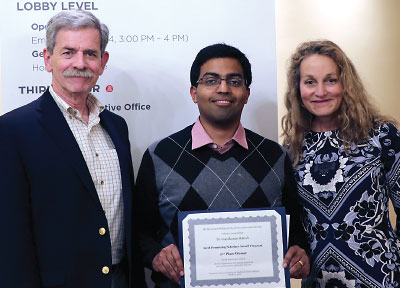Residents Honored for Research on Tardive Dyskinesia
Abstract

Stanley Caroff, M.D. (left), and Leslie Lundt, M.D. (right), pose with one of the winning residents of the 2018 Promising Scholars Award Program for original papers on tardive dyskinesia, Gopalkumar Rakesh, M.D., a research fellow at Duke University. The other winner was Haitham Salem, M.D., a PGY-2 psychiatry resident at the University of Texas at Houston. The residents were honored at IPS: The Mental Health Services Conference, held last month in Chicago.
Caroff is an emeritus professor of psychiatry at the University of Pennsylvania and director of the Neuroleptic Malignant Syndrome Information Service (NMSIS), and Lundt is medical director of Neurocrine Biosciences, the manufacturer of Ingrezza (valbenazine).
Both NMSIS and Neurocrine sponsored the competition. Submissions were evaluated on the basis of their relevance to tardive dyskinesia, originality, scientific rigor, clinical significance, and other factors. ■



